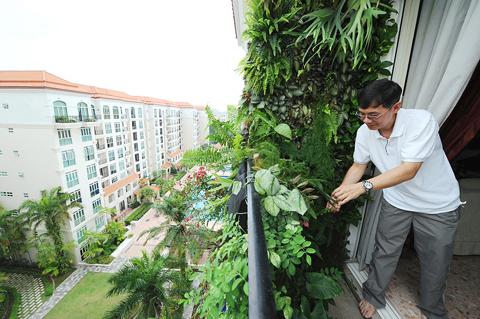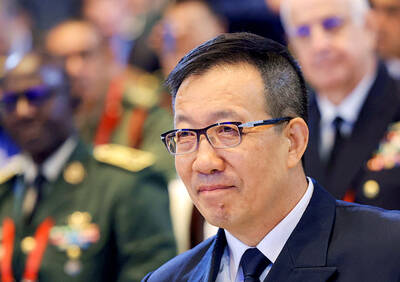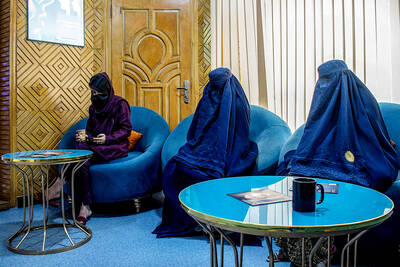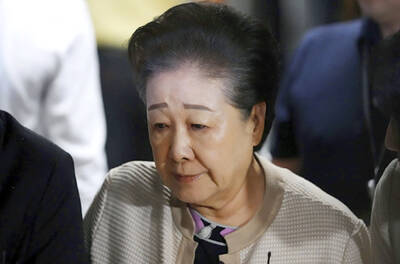When Albert Quek first moved into his home on the top floor of an eight-story apartment block, he agonized about the limited space he had to pursue his passion for gardening.
All he had was a 1m² balcony, barely large enough for his wife to sun the laundry, let alone for him to nurture a garden.
Then he had a brainwave.

PHOTO: AFP
“Why don’t I do something vertical?” he mused to himself.
A year later, Quek’s garden, which features more than 10 varieties of flowering shrubs, ferns and herbs cascading down his wall, crowns his block with a shock of green, contrasting sharply with the staid colors of neighboring buildings.
Singapore hopes others will follow his example and turn this already verdant metropolis into a high-rise garden city.
Tourists have long been attracted by Singapore’s lush parks and tree-lined streets, the result of a long-term urban planning strategy aided in no small part by lots of sunshine and rain.
“There’s so much greenery here, it makes the place very beautiful,” said Mario Quaramita, 37, a tourist from Italy.
Despite its compact size, Singapore already has 3,300 hectares, or almost 5 percent of its total land mass, occupied by “green areas,” which include parks, rainforests and nature reserves.
The Urban Redevelopment Authority (URA) and National Parks Board hope to add another 50 hectares of greenery by 2030 through two landmark schemes introduced in April.
One is Programme LUSH (Landscaping for Urban Spaces and High-rises) and the other is an incentive scheme for greening tower and home roofs, both aimed at encouraging Singaporeans to adopt greenery at home, work and leisure areas.
Property developers in specific districts are also required to design buildings with integrated gardens to make up for greenery lost as a result of construction.
“We are constantly looking for ways to enhance this sense of greenery,” said Chen Hsing Yao, deputy director for urban design in the URA.
Establishments already boasting high-rise greenery say people are receptive to the concept.
The National Library’s main building, which incorporates sky terraces and rooftop gardens into its brightly-lit architectural design, says visitors enjoy the green respite from the urban landscape.
“Besides the aesthetic appeal, visitors and staff welcome the provision and convenient access to these green open spaces in the bustling city area,” a spokesman for the library said.
He said visitors from around the region and the US have studied the green features of the building.
Indeed, greenery is being adopted as a main point of attraction by some businesses, including the Keyaki Japanese Restaurant, perched on a rooftop garden at the five-star Pan Pacific Hotel.
Its traditional Japanese garden aims to give diners “an immediate sensation of being removed from the contemporary interior of the hotel,” the restaurant’s spokeswoman said.
One George Street, an office tower primarily housing multinational firms, says office workers appreciate the tranquility of its “sky gardens.”
“Besides providing visual relief from the high-density urban landscape of the business district, these landscaped gardens improve air quality, lower the ambient temperature and help to reduce energy consumption,” owner CapitaCommercial Trust said.
The developers of the executive condominium Newton Suites also attest to such benefits as its sky gardens, beside the lift lobby at every fourth level, make the condominium blocks stand out from the surroundings.
Quek, the homeowner who pioneered “DIY [do-it-yourself] Vertical Gardening” which involves growing plants on walls instead of flat ground, says skyrise greenery is well-adapted to Singapore’s wet and humid environment.
Quek, whose own vertical gardens have won a number of awards, said: “These gardens are space-saving, and it’s easy to maintain. It also can help to cool down the indoor temperature.”
Quek is not stopping at cultivating vertical gardens for aesthetic purposes.
“I would like to plant some fruits, or even some spices for cooking in my vertical garden,” he said.

BEIJING FORUM: ‘So-called freedom of navigation advocated by certain countries outside the region challenges the norms of international relations,’ the minister said Chinese Minister of National Defense Dong Jun (董軍) yesterday denounced “hegemonic logic and acts of bullying” during remarks at a Beijing forum that were full of thinly veiled references to the US. Organizers said that about 1,800 representatives from 100 countries, including political, military and academic leaders, were in Beijing for the Xiangshan Forum. The three-day event comes as China presents itself as a mediator of fraught global issues including the wars in Ukraine and Gaza. Addressing attendees at the opening ceremony, Dong warned of “new threats and challenges” now facing world peace. “While the themes of the times — peace and development —

Venezuela on Saturday organized a day of military training for civilians in response to the US deployment in the Caribbean, and amid new threats from US President Donald Trump. About a month ago, Washington deployed warships to international waters off Venezuela’s coast, backed by F-35 jets sent to Puerto Rico in what it calls an anti-drug and anti-terrorism operation. Venezuelan Minister of Defense Vladimir Padrino Lopez has accused Washington of waging “undeclared war” in the Caribbean, after US strikes killed over a dozen alleged drug traffickers off his country’s coast. Caracas also accused the US of seeking regime change, and

Decked out with fake crystal chandeliers and velvet sofas, cosmetic surgery clinics in Afghanistan’s capital are a world away from the austerity of Taliban rule, where Botox, lip filler and hair transplants reign. Despite the Taliban authorities’ strict theocratic rule, and prevailing conservatism and poverty in Afghanistan, the 20 or so clinics in Kabul have flourished since the end of decades of war in the country. Foreign doctors, especially from Turkey, travel to Kabul to train Afghans, who equally undertake internships in Istanbul, while equipment is imported from Asia or Europe. In the waiting rooms, the clientele is often well-off and includes men

BRIBERY ALLEGATIONS: A prosecutor said they considered the risk of Hak-ja Han tampering with evidence to be very high, which led them to seek the warrant South Korean prosecutors yesterday requested an arrest warrant for the leader of the Unification Church, Hak-ja Han, on allegations of bribery linked to the country’s former first lady and incitement to destroy evidence. The move came a day after the 82-year-old was questioned over her alleged role in bribing former first lady Kim Keon-hee and a lawmaker. Founded in 1954 by her late husband, Sun Myung Moon, the Unification Church has long been the subject of controversy and criticism, with its teachings centered on Moon’s role as the “second coming” and its mass weddings. Followers are derisively referred to as “Moonies.” However, the church’s